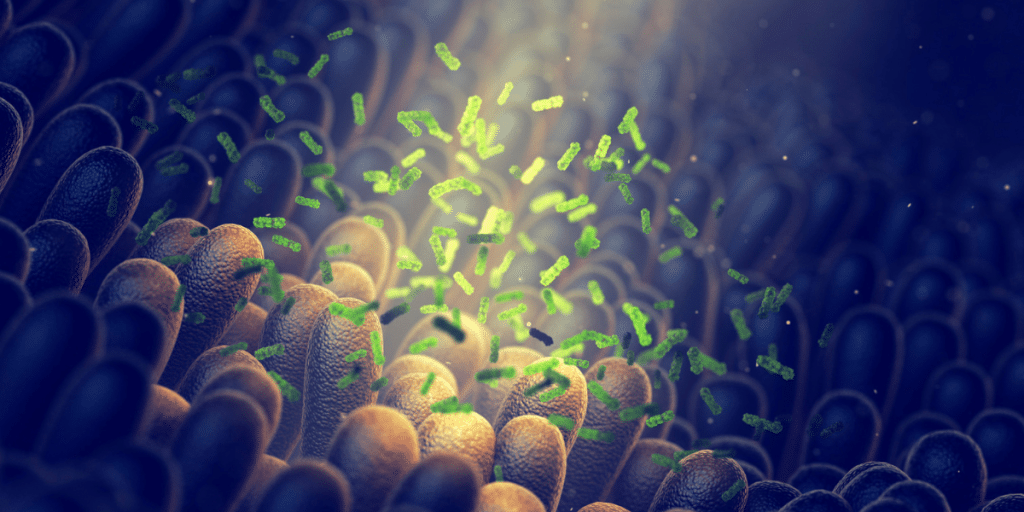You might assume that the function of your gut is limited to digestion or how food is broken down, ingested, filtered, and expelled. In actual fact, the microbiome in our gut significantly impacts our overall health and well-being. It regulates our immune system, protects us from infections, and assists with nutrient absorption.
Your gut microbiome has a better ability to predict your health outcomes than your genes do. In this blog, we’ll look at the gut microbiome, how it affects our health, and how to keep it healthy and balanced.
What is the gut microbiome?
Did you know the human body contains more bacterial cells than human cells? Trillions of bacteria, viruses, and fungi reside in your body, and they are collectively known as the microbiome. Although some bacteria are harmful and lead to illness, others are crucial for your immune system, heart, weight, hormones, and other elements of your overall health.

Many factors affect the kind and quantity of bacteria we harbor, and although the majority of us fall under one particular “enterotype,” each person has a distinct population of bacteria.
A well-balanced gut microbiome helps maintain good health by regulating the immune system, protecting against infections, and assisting in nutrient absorption. But some things, such as poor food, stress, drugs, and environmental toxins, can upset the delicate balance of the gut microbiome, which further throws everything else out of balance. In fact, people who suffer from chronic issues, such as weight gain, hormone imbalance, skin problems, anxiety, frequent illnesses, and more, typically have poor gut health as the root cause.
For this reason, keeping a healthy gut microbiome is crucial for maintaining overall health.
How does the gut microbiome affect your overall health and well-being?
Hippocrates famously stated, “All disease begins in the gut,” recognizing that the body is interconnected. When we eat a well-prepared, nutrient-dense diet, limit processed foods, refined grains, alcohol, and sugar, and stay hydrated, the gut keeps us nourished and balanced, setting the tone for a healthy, vibrant, disease-free, and happy human.
Certain gut microbes can produce small molecules and aid in synthesizing vitamins, enzymes, and hormones that our bodies require.
On the other hand, as discussed, an unhappy and unbalanced gut can lead to health problems, including:
- Constipation
- Diarrhea
- Bloating
- Fatigue
- Acid reflux
- Eczema
- Inflammatory bowel disease (IBD)
- Irritable bowel syndrome (IBS)
Poor gut health can also impact hormones. When one has an imbalance in the gut microbiome, hormones also become imbalanced, increasing the risk of estrogen-related diseases like PCOS, endometriosis, and even breast cancer.
How to maintain good gut health
Fortunately, there are many ways in which you can maintain a healthy, balanced, and optimal gut microbiota.

Eat a diverse range of foods
Your intestines are home to hundreds of different kinds of bacteria, each of which has a unique function in maintaining health and differing nutritional requirements. In general, a diversified microbiome is considered a healthy one. Hence, eating foods from different food groups (especially fruit, vegetables, and legumes) allows your gut to thrive and get the necessary nutrients to function correctly and promote the growth of healthy bacteria.
Eat fermented foods
Fermented foods, such as yogurt, kefir, kimchi, and kombucha, enhance gut health by delivering probiotics into the gut microbiome. These living microorganisms are abundant in fermented foods and can help balance the gut microbiome by increasing the diversity of helpful bacteria.
Prebiotics are indigestible fibers that can also be found in fermented foods. Prebiotics support the probiotics’ growth and multiplication, which enhances the gut microbiome’s overall equilibrium.
Eat foods rich in polyphenols
Plant substances called polyphenols have several health advantages, such as lowering blood pressure, inflammation, cholesterol levels, and oxidative stress. These can be found in dark chocolate, red wine, green tea, almonds, and blueberries. Unfortunately, human cells cannot efficiently digest polyphenols, but gut bacteria can do so.
Prioritize regular aerobic exercise
Many parts of the human body, including the microbiome, benefit from movement. For example, aerobic exercise helps the gut in several ways, one of which is increased blood flow to the digestive system. This increased blood flow aids digestion and nutrient absorption while also decreasing gut inflammation. In addition, aerobic exercise can also help relieve stress, which is known to disrupt the gut microbiome’s balance.
Take a probiotic
Adding probiotic supplements to a healthy diet and lifestyle can benefit gut health and overall well-being. By introducing beneficial bacteria, probiotic supplements can help restore balance to the gut microbiome. This can aid digestion, reduce inflammation, and lower the risk of digestive issues such as diarrhea, constipation, and irritable bowel syndrome (IBS).
Don’t take antibiotics unless you really need to
There are times when antibiotics are necessary, but you should not take them if you do not need them. This is because antibiotics can potentially wipe out beneficial bacteria in the gut, leaving it open to colonization by harmful bacteria. This can result in an overgrowth of harmful bacteria in the gut, causing various digestive issues such as diarrhea, constipation, and abdominal pain.
Conclusion
A healthy gut helps to keep you healthy by regulating your immune system, protecting you from infections, and aiding in nutrient absorption. On the other hand, an unbalanced gut can lead to various health problems. Fortunately, eating a diverse range of foods, consuming fermented foods and foods high in polyphenols, regular exercise, and supplementing with a high-quality probiotic can help you maintain a healthy gut. In addition, avoiding unnecessary antibiotics can also help to protect the gut microbiome.
